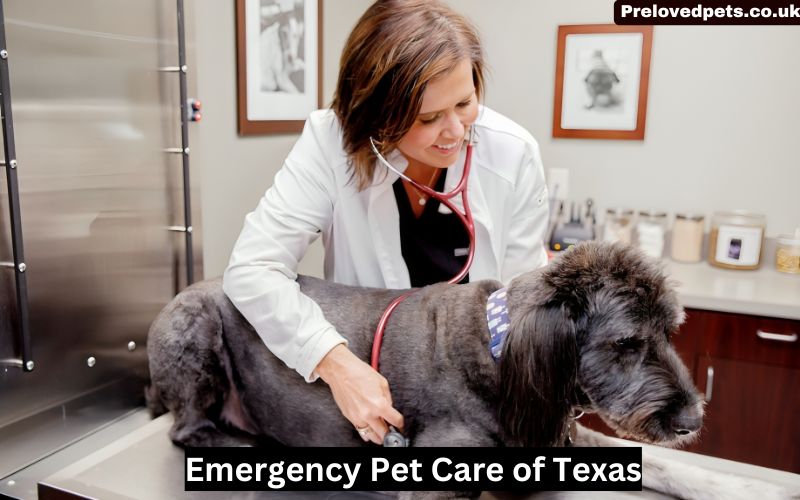In the realm of pet care, emergencies can strike without warning. Whether it’s a sudden illness, an accident, or an unexpected health crisis, the ability to access immediate and effective emergency care can be a decisive factor in the well-being of your pet. In Texas, a state known for its diverse landscapes and large population, Emergency Pet Care of Texas (EPCT) stands as a leading provider of urgent and critical care services for pets. This comprehensive guide will explore EPCT in detail, including its facilities, services, and role in the community, ensuring that pet owners are well-informed and prepared for any emergencies that may arise.
Overview of Emergency Pet Care in Texas
Importance of Emergency Pet Care
Pet emergencies can happen at any time, and they often require quick and efficient action. For many pet owners, understanding the importance of emergency care is the first step in ensuring their pets receive the best possible treatment. In emergency situations, time is of the essence. Delays in treatment can lead to complications or even be life-threatening. Emergency pet care services are designed to provide rapid assessment, stabilization, and treatment to address acute health issues. These services are crucial for handling a variety of situations, from accidents and trauma to severe illnesses and poisoning.
Emergency Pet Care of Texas: An Introduction
Emergency Pet Care of Texas (EPCT) has established itself as a premier network of facilities dedicated to providing urgent and critical care for pets. With multiple locations across Texas, EPCT offers a range of specialized services to handle a wide spectrum of emergency situations. The organization is known for its state-of-the-art facilities, skilled medical teams, and comprehensive care approach. By operating 24/7, EPCT ensures that pets receive immediate attention, regardless of the time or day.
Facilities and Services Offered by Emergency Pet Care of Texas
State-of-the-Art Facilities
EPCT prides itself on its modern and well-equipped facilities. Each location is outfitted with advanced medical technology to support the diagnosis and treatment of emergency cases. Key features include:
- Digital Radiography: This technology provides high-resolution images for accurate diagnosis of fractures, tumors, and other internal issues. Digital radiography is essential for quick and precise assessment, allowing for timely intervention.
- Ultrasound Equipment: Ultrasound is used to examine internal organs and detect issues such as fluid accumulation or organ abnormalities. This non-invasive imaging technique is crucial for diagnosing conditions that are not visible through X-rays.
- Laboratory Diagnostics: On-site laboratories enable rapid testing of blood, urine, and other samples. Quick diagnostic results are vital for determining the appropriate treatment for conditions like infections, poisoning, or metabolic disorders.
Emergency Services
One of the defining features of EPCT is its commitment to providing emergency services around the clock. Unlike regular veterinary clinics that operate during standard business hours, EPCT’s facilities are open 24/7, including weekends and holidays. This continuous availability ensures that pets in critical condition receive prompt care at any time. The 24/7 service model is particularly important for managing severe injuries, sudden illnesses, and other urgent situations that require immediate attention.
Specialized Medical Teams
EPCT’s medical teams consist of highly trained veterinarians and specialized technicians. These professionals have extensive experience in emergency and critical care, equipping them to handle complex and high-stress situations. The team includes:
- Emergency Veterinarians: These specialists are skilled in diagnosing and treating acute medical conditions. They are trained to make quick decisions and perform life-saving procedures when necessary.
- Critical Care Technicians: These technicians provide continuous monitoring and support for critically ill or injured pets. They are adept at managing intensive care units and administering treatments as directed by veterinarians.
- Surgical Specialists: For emergencies requiring surgery, EPCT has experienced surgeons who perform both routine and complex procedures. Their expertise ensures that pets receive high-quality surgical care in critical situations.
Critical Care Units
Critical care units at EPCT are designed to provide intensive care for pets with severe conditions. These units are equipped with advanced monitoring systems and medical equipment to support pets during critical periods. Features of critical care units include:
- Advanced Monitoring: Continuous monitoring of vital signs such as heart rate, respiratory rate, and blood pressure helps track the pet’s condition and detect any changes that require immediate intervention.
- Life-Support Equipment: Critical care units have life-support systems, including ventilators and infusion pumps, to assist with breathing and medication administration.
- Isolation Facilities: For pets with contagious conditions, isolation facilities prevent the spread of diseases and protect other patients.
Surgical Services
Emergencies often involve injuries or conditions that require surgical intervention. EPCT’s surgical services encompass:
- Emergency Surgery: This includes procedures such as repairing internal injuries, removing foreign objects, or addressing acute abdominal issues. Emergency surgeries are performed promptly to address immediate threats to the pet’s health.
- Orthopedic Surgery: For pets with broken bones or joint injuries, EPCT offers orthopedic surgical procedures to restore function and alleviate pain.
- Soft Tissue Surgery: This involves surgeries on organs and tissues, such as removing tumors or repairing damaged organs. Soft tissue surgeries are crucial for treating internal injuries and diseases.
Diagnostic Services
Rapid and accurate diagnosis is essential for effective emergency care. EPCT provides comprehensive diagnostic services, including:
- Blood Tests: Blood tests help identify infections, organ dysfunction, and other health issues. EPCT’s in-house laboratory allows for quick turnaround times, which is critical in emergencies.
- Imaging: In addition to X-rays and ultrasounds, EPCT may use CT scans or MRI for detailed imaging, especially for complex cases requiring a thorough examination.
- Urinalysis: Testing urine samples provides insights into kidney function and can help diagnose urinary tract infections or other conditions.
Pharmacy Services
EPCT includes a pharmacy within its facilities to ensure that medications and treatments are readily available. This in-house pharmacy allows for:
- Immediate Medication Access: Pets requiring urgent medications can receive prescriptions and treatments without delays, enhancing the effectiveness of emergency care.
- Customized Treatments: Pharmacists at EPCT can prepare specialized medications or adjust dosages based on the specific needs of each pet.
Common Emergency Situations and How EPCT Handles Them
Trauma and Injuries
Trauma from accidents, falls, or attacks is a common emergency scenario. EPCT’s approach to handling trauma includes:
- Initial Assessment: The first step is to stabilize the pet’s condition and address any immediate life-threatening issues, such as bleeding or shock.
- Pain Management: Effective pain relief is crucial for trauma cases. EPCT administers analgesics and other medications to manage pain and discomfort.
- Surgical Intervention: If necessary, surgical procedures are performed to repair injuries, such as fractures or internal damage.
- Follow-Up Care: Post-trauma care includes monitoring for complications and providing rehabilitation support to aid recovery.
Poisoning and Toxicity
Exposure to toxic substances can lead to severe health issues. EPCT’s response to poisoning includes:
- Decontamination: Depending on the toxin, decontamination methods may include inducing vomiting, administering activated charcoal, or flushing the gastrointestinal tract.
- Antidote Administration: For certain poisons, specific antidotes are available to counteract the effects. EPCT provides targeted treatments based on the type of toxin involved.
- Supportive Care: Treatment may involve intravenous fluids, medications, and supportive care to manage symptoms and support recovery.
Respiratory Distress
Respiratory issues require prompt evaluation and treatment. EPCT’s approach includes:
- Oxygen Therapy: Pets experiencing difficulty breathing receive oxygen therapy to improve oxygen levels and alleviate respiratory strain.
- Diagnostic Testing: Diagnostic tests, such as chest X-rays or ultrasounds, help identify the underlying cause of respiratory distress, such as pneumonia or fluid accumulation.
- Treatment: Treatment may involve medications to address infections or inflammation, as well as supportive care to aid breathing.
Gastrointestinal Emergencies
Gastrointestinal issues, such as obstructions or severe vomiting, require urgent attention. EPCT handles these emergencies by:
- Diagnostic Evaluation: Tests such as X-rays or ultrasounds help identify the cause of gastrointestinal distress, such as foreign bodies or tumors.
- Treatment: Depending on the diagnosis, treatment may involve surgery to remove obstructions, medications to manage symptoms, or dietary changes to support recovery.
- Monitoring: Pets with gastrointestinal issues are closely monitored for signs of complications, such as dehydration or infection.
Urinary Tract Issues
Urinary tract emergencies, including blockages or severe infections, are managed by EPCT through:
- Immediate Relief: For urinary blockages, procedures such as catheterization are performed to relieve pressure and restore normal urine flow.
- Diagnostic Testing: Tests to assess kidney function and identify infections guide treatment decisions.
- Treatment: Treatment may include medications, surgery, or other interventions to address the underlying cause of urinary tract issues.
Seizures and Neurological Issues
Neurological emergencies, such as seizures, require rapid assessment and intervention. EPCT’s approach includes:
- Seizure Management: Immediate care focuses on stopping seizures and ensuring the pet’s safety during episodes.
- Diagnostic Testing: Neurological evaluations, including imaging and blood tests, help diagnose the cause of seizures, such as tumors or infections.
- Treatment: Treatment may involve medications to control seizures and address any underlying neurological conditions.
Preparing for Emergencies: Tips for Pet Owners
Recognizing Emergency Signs
Understanding the signs of a pet emergency can lead to quicker intervention. Key symptoms to watch for include:
- Lethargy or Weakness: Unusual tiredness or weakness can indicate a serious health issue, such as internal bleeding or organ failure.
- Excessive Vomiting or Diarrhea: Persistent vomiting or diarrhea may signal a gastrointestinal problem or poisoning.
- Difficulty Breathing: Labored breathing or coughing can be signs of respiratory distress or other serious conditions.
- Unusual Behavior: Sudden changes in behavior, such as aggression or hiding, can indicate pain or discomfort.
Creating an Emergency Kit
An emergency kit can help ensure you are prepared for any situation. Essential items to include are:
- Medical Records: Keep a copy of your pet’s medical history, including vaccination records and any chronic conditions.
- Medications: Include any current medications your pet is taking, along with dosing instructions.
- First-Aid Supplies: A first-aid kit should contain items such as bandages, antiseptics, and tweezers.
- Contact Information: Have contact details for your nearest emergency care provider, such as EPCT, as well as your regular veterinarian.
Establishing a Relationship with an Emergency Care Provider
Knowing your emergency care options in advance can reduce stress during a crisis. Consider:
- Researching Facilities: Familiarize yourself with the locations, services, and contact details of emergency care providers like EPCT.
- Visiting the Facility: If possible, visit the emergency facility to become acquainted with the staff and the environment.
- Updating Information: Ensure your contact information and your pet’s details are up-to-date with the emergency care provider.
The Role of EPCT in the Community
Educational Initiatives
EPCT is committed to educating pet owners and the community about pet health and emergency preparedness. Educational initiatives include:
- Workshops and Seminars: EPCT hosts events to provide information on pet care topics, including first aid, emergency response, and general health.
- Online Resources: The EPCT website and social media platforms offer articles, videos, and tips on various aspects of pet care and emergency preparedness.
- Community Outreach: EPCT collaborates with local organizations to raise awareness and provide resources for pet owners.
Collaborations with Local Veterinarians
EPCT works closely with local veterinarians to ensure seamless care for pets requiring emergency services. Collaborations include:
- Referral Networks: Local veterinarians can refer patients to EPCT for specialized emergency care, ensuring continuity of treatment.
- Shared Resources: EPCT and local veterinarians may share resources and knowledge to enhance overall pet care in the community.
Support for Pet Owners
In addition to medical care, EPCT provides support and guidance for pet owners during emergencies. This support includes:
- Emotional Support: Recognizing the stress of emergency situations, EPCT offers compassionate care and counseling for pet owners.
- Financial Assistance: EPCT may provide information on financial options or assistance programs to help manage the costs of emergency care.
Success Stories and Case Studies
Notable Recoveries
Highlighting specific cases where EPCT’s intervention led to successful outcomes can demonstrate the effectiveness of their emergency care. Examples include:
- Case Study 1: A dog involved in a severe car accident received immediate stabilization and surgery at EPCT. The prompt care resulted in a full recovery and a return to normal activity.
- Case Study 2: A cat with poisoning from a toxic plant was treated with decontamination and antidotes at EPCT. The pet recovered quickly and was able to return home.
Client Testimonials
Testimonials from pet owners who have experienced EPCT’s services provide valuable insights into the quality of care and support. Sample testimonials include:
- Testimonial 1: “EPCT saved my dog’s life after a serious injury. The care and compassion they showed were incredible. I’m grateful for their expertise and support.”
- Testimonial 2: “When my cat ingested something toxic, EPCT was there for us every step of the way. Their quick response and professional care made all the difference.”
How to Contact Emergency Pet Care of Texas
Contact Information
Detailed contact information for each EPCT location ensures that pet owners can reach out in emergencies. This includes:
- Phone Numbers: Provide the emergency contact numbers for each facility.
- Addresses: List the physical addresses of EPCT locations for easy access.
- Hours of Operation: Although EPCT operates 24/7, include information on any specific services or departments with varying hours.
Online Resources
EPCT’s website and social media platforms offer additional resources and information for pet owners. Visit their website for:
- Location Finder: Tools to locate the nearest EPCT facility.
- Appointment Scheduling: Options for scheduling consultations or follow-up visits.
- Educational Content: Access to articles, videos, and other resources on pet health and emergency preparedness.
See Also: Canada Pet Care Reviews
Conclusion
Emergency Pet Care of Texas plays a vital role in providing expert and compassionate care for pets in urgent situations. With state-of-the-art facilities, specialized medical teams, and a commitment to community education, EPCT ensures that pets receive the highest level of care during emergencies. By understanding the services offered and being prepared for potential crises, pet owners can help ensure their furry friends receive the best possible care when they need it most. Whether it’s a sudden illness, an accident, or any other urgent situation, knowing that EPCT is there to provide support and treatment offers peace of mind and confidence in managing pet emergencies.




